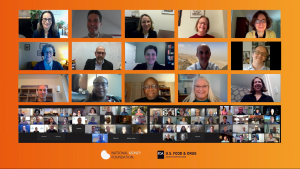
Barbara Gillespie, MD, FASN, Keisha Gibson, MD, MPH, and Amy Mottl, MD, participated in a virtual scientific workshop sponsored by the National Kidney Foundation and the US Drug Administration on December 14-17. They were among 90 people representing a range of key stakeholders including faculty experts in clinical trials, nephrology and other relevant topic areas, patients, payers, health economists, regulators and policy makers. The title of the workshop was “Developing Treatments for Early Stages of Common, Chronic Kidney Diseases: Clinical Trial Considerations.” Mottl and Gillespie served as co-leads for small group discussions.
The discussion and conclusions from the conference will be summarized in a white paper published in a peer-reviewed journal and will also be the basis for additional professional education activities by the National Kidney Foundation.
Workshop Description
Chronic kidney disease (CKD) is a progressive chronic disease that results in loss of GFR over time, and, in some patients, progression to kidney failure. Treatments can slow or prevent progression, or ideally would reverse the functional decline and restore GFR to more normal levels. Instituting such treatments at the earliest stages of disease might be expected to result in the greatest benefit to patients, at least with respect to reducing the risk of progression to kidney failure. The goal of all treatments is that they should be effective, safe and relevant.
Emerging evidence support the validity alternative endpoints to facilitate clinical trials for CKD progression (A list of the resulting papers and relevant literature is located at the end of this document). Previously late manifestations of CKD such as kidney failure or doubling of serum creatinine have been accepted as endpoints for trials of CKD progression. The alternative endpoints based on lesser magnitude of GFR decline, GFR slope, or changes in albuminuria allow for investigations of therapies for earlier stages of diseases than had been previously allowed. This is important progress in the field of CKD, as advanced stages of kidney disease may be too late for most interventions particularly those investigations aimed at treating the underlying disease process or the initiating factors. Before these alternative endpoints can be instituted widely in trials of early stages of common kidney diseases, such as diabetic kidney disease, further input is needed from the wide community of stakeholders, including patients, health care professionals, payers, industry, trialists, regulators, and policy makers, regarding whether there is value in treatment and prevention of early kidney disease, as well as questions related to the design of trials in early stages of common kidney diseases, including who should be enrolled, and the size and nature of the safety database needed to support approval.